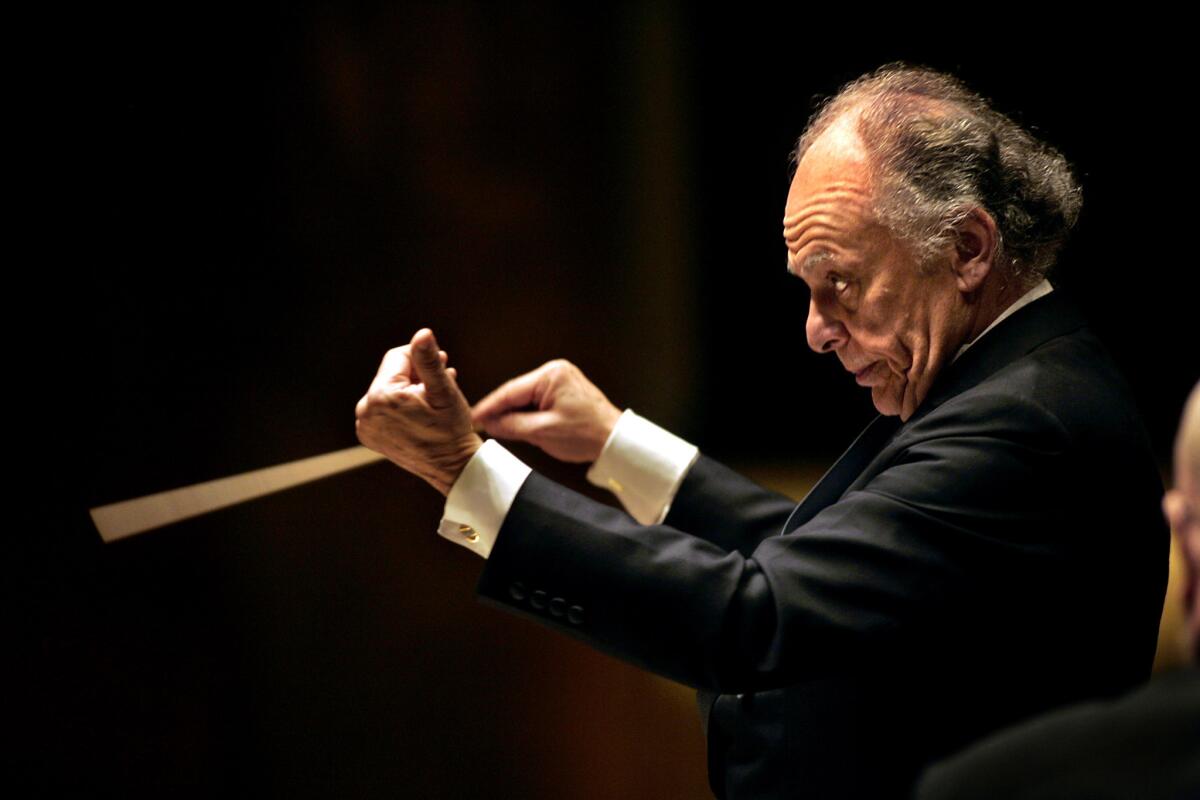An Appreciation: Lorin Maazel conducted himself inimitably

- Share via
I didn’t understand Lorin Maazel, the exceptional conductor who died Sunday at 84. Who did?
Even his family may not have completely gotten him. He complained in an interview two years ago that his kids would laugh off the property anyone calling Maestro Maazel imperious.
But you’d better call him maestro. His fascinating website, which includes his imperious and outspoken blog, is, by the way, https://www.maestromaazel.com.
On some level Maazel was, or at least should have been, one of us. Though born in Paris to American parents, he grew up in Los Angeles. He conducted in knee pants at the Hollywood Bowl and went on to become music director of three major American orchestras — the Cleveland Orchestra, Pittsburgh Symphony and New York Philharmonic.
In Europe, Maazel headed the Deutsche Oper Berlin, the Vienna State Opera, the Bavarian Radio Orchestra (in Munich), the Munich Philharmonic and was music director of a new opera house in Valencia, Spain. He guest conducted over 200 different orchestras in over 7,000 performances. He made more than 350 recordings. He was hard to miss.
Last March, Maazel stepped in for an ailing colleague decades younger on a Vienna Philharmonic tour in California. For the appearance at Renée and Henry Segerstrom Concert Hall in Costa Mesa, a stool had been put on the podium, presumably in deference to his age. He did walk on stage more gingerly than was usual, but he imperiously moved the stool aside. He still had stamina. He drew out a performance of Mahler’s Fourth Symphony to around 70 minutes, 10 minutes longer than anyone else would dare these days.
What I didn’t understand about Maazel, who I heard conduct all my life and whose recordings I have been buying for as long as I’ve been buying recordings, is why he conducted the way he did or exactly how he did it. Not that he could care. He never gave the impression of bothering all that much about the audience. What concerned him was the music, what was inside the score that no one else had ever teased out, and the most efficient way to get what he wanted from the orchestra.
He had an incomparable stick technique (something he pooh-poohed as a technique). A brilliantly accomplished musician (he was a virtuoso violinist and a composer), he boasted what must have been a genius-level IQ. He appeared capable of playing four-dimensional mental chess while carrying on a dinner conversation with lesser mortal beings.
Maazel could also be a sublime trickster. On one level, he seemed about as corporate as a conductor could get. He commanded obscenely high fees (which he negotiated himself). He took home over $3 million his final 2008-9 season at New York Philharmonic. Apparently the Munich Philharmonic wooed him with a much higher figure.
What made these fees obscene were that not only did he leave the New York Philharmonic with a substantial deficit, but his raising the bar so high has left other orchestras struggling to meet competitive music director demands.
On the other hand, Maazel, ever a bundle of contradictions, was also a free-spending subversive. He was an easy touch for charities. He had a soft spot for education. When the philanthropist Alberto Vilar backed out of his commitment to sponsor a conducting competition that Maazel had begun, Maazel simply picked up the full tab himself.
He ended his life putting on a summer festival with young people at his home in Castleton, Va., which he underwrote to the tune of $2.5 million a year.
Maybe that’s not subversive, but spending another $2 million to have his opera “1984” produced in 2005 by the Royal Opera in London was. The British press interpreted this as simply buying the opera house in Covent Garden. But Maazel was politically outspoken in a way American music directors rarely dare.
Two decades earlier, he walked away from Vienna State Opera in protest of the Austrian government’s intervention in arts administration. Now he wanted, through “1984,” to make a statement about how he believed the Bush administration had been encroaching on individual rights. Though the opera is musically conventional, it holds the stage extremely well and makes its point strongly enough that no opera company in the U.S. would go near it.
Free expression was a cause for Maazel. In 2008, he took the New York Philharmonic tour to Pyongyang. Some saw this as a publicity stunt, but Maazel insisted that by showing the North Koreans an example of American freedom as found in its arts, he was fighting repression.
Ultimately, though, the most controversial tricksterism was his conducting. Maazel messed with music. That magnified Mahler Fourth he conducted in Orange County was inflated for a purpose. Like a medical researcher dissecting a cadaver, Maazel wanted to see what was inside, what made Mahler tick. So he stretched and squeezed and twisted and put under a microscope inner melodic material as if it, too, were organic matter. The results could be grotesque, but they could also achieve a state of wonder.
Maazel even died a trickster. The last piece he conducted, two weeks after the Mahler Fourth, was Strauss’ “Till Eulenspiegel’s Merry Pranks” in Munich.
The last entry on his website is something he wrote in the style of the experimental French writer Georges Perec, leaving out the vowel e. “Our MA,” he concluded, referring to himself as Musical Author, “forms a wall of missing links, making all again wondrous, a firm chain, bound anchors of magic.”
An all-knowing trickster to the end, MM (Maestro Maazel), provided, in effect, his own epitaph: A wall of missing links and wondrous anchors of magic.
More to Read
The biggest entertainment stories
Get our big stories about Hollywood, film, television, music, arts, culture and more right in your inbox as soon as they publish.
You may occasionally receive promotional content from the Los Angeles Times.











